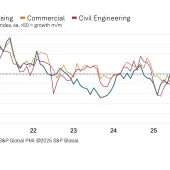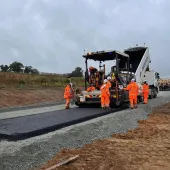Latest MPA figures reflect weakened activity

UK construction frailty confirmed by falling demand for heavy-side building materials in 2019
DEMAND for heavy-side building materials in Great Britain, including aggregates, asphalt, ready-mixed concrete and mortar, was weak throughout 2019, with demand failing to pick up again in the final quarter of the year, says the Mineral Products Association (MPA).
According to the MPA’s latest seasonally adjusted building materials sales volumes figures, sales of these materials were lower in 2019 compared with 2018 – down 3.9% for ready-mixed concrete, –2.2% for aggregates, –1.7% for mortar and –0.8% for asphalt.
The Association says the declining markets provide tangible evidence of weakening UK construction activity, corroborating a range of other business surveys.
Mortar sales volumes declined by 8.6% in the final quarter of 2019, compared with the previous quarter, representing the sharpest quarterly fall since mid-2012. Sales volumes of this material have now declined in six of the last eight quarters, providing a clear indication of house-building activity running out of steam, says the MPA.
Meanwhile, falling demand for materials such as aggregates and ready-mixed concrete indicates that ongoing construction work appears to be focusing on existing and finishing sites, rather than new ones, with the MPA warning that a further slowdown in activity cannot be ruled out over the next few months.
Likewise, ready-mixed concrete sales have now declined for three consecutive years, driven by weak demand in London and the South East, where both house building and commercial construction work slowed.
There were, however, some brighter spots in the West Midlands and the South West throughout the year, where ready-mixed concrete sales have been supported by infrastructure work, including HS2 enabling works and Hinkley Point C.
Linked to general road activity, growth prospects for asphalt sales in recent years have been geared primarily toward supplying for the Highways England’s five-year Road Investment Strategy programme, which originally included 112 projects to be completed over the period 2015–2020.
However, continued delays due to management and funding issues have impacted on project delivery and, as a result, asphalt sales volumes in 2019 remained broadly flat, as they have done since the end of 2016.
‘The prospects for heavy-side building materials markets in 2020 remain weak,’ explained Aurelie Delannoy, the MPA’s director of economic affairs. ‘All indicators suggest that UK construction and its supply chain will have to wait until 2021 for growth to slowly resume, provided work in the roads, rail and energy sectors accelerate as planned.’
With uncertainty continuing to linger for key infrastructure projects such as the long-awaited HS2, for which the industry has called on the Prime Minister to make a firm and swift decision, to give the mineral products sector more confidence to invest and, in turn, boost growth, Ms Delannoy added the economic and political uncertainty generated by the Brexit process had stifled private investment in the sector in the past three years.
‘Despite the recent breakthrough in the negotiations of the Withdrawal Agreement, this may continue as the negotiations about future trade unfold and the risk of a ‘No Deal’ remains to the end of 2020,’ she warned.









